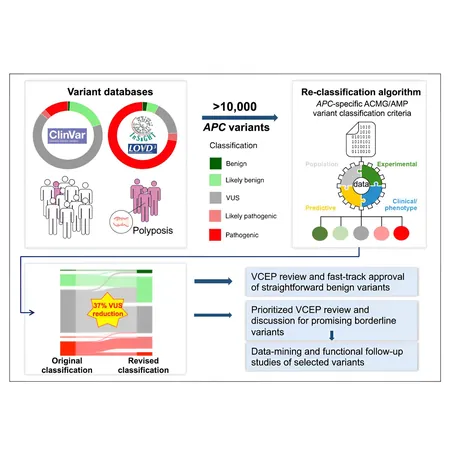
Groundbreaking Study Reclassifies Genetic Variants Linked to Hereditary Colorectal Cancer: Major Relief for Families
2024-10-01
Groundbreaking Study Reclassifies Genetic Variants Linked to Hereditary Colorectal Cancer: Major Relief for Families
In a significant advancement for families grappling with hereditary colorectal cancer, researchers have reclassified a large portion of genetic variants previously thought to be concerning as benign. This breakthrough not only lessens anxiety for those carrying these variants but also enhances the quality of medical care they receive.
Led by the University Hospital Bonn (UKB) and the University of Bonn, an international team has undertaken the important task of reassessing the unclear genetic variants associated with hereditary colorectal cancer. Their findings were recently published in The American Journal of Human Genetics.
Understanding Hereditary Cancer Risks
Families with hereditary cancer syndromes face a heightened risk of developing various cancers, including colon and breast cancer. Fortunately, advancements in genetic testing allow for early detection and effective screening programs that can significantly reduce cancer risk. However, with these advancements comes the challenge of deciphering the medical relevance of numerous genetic variants identified during testing.
Many of these identified genetic variants, known as variants of uncertain significance (VUS), complicate diagnosis and can lead to increased anxiety for patients and their families. In fact, recent data indicates that over 50% of variants for certain genes are classified as VUS, rendering them ineffective for both diagnosis and risk assessment.
Dr. Isabel Spier from the Institute of Human Genetics emphasized the worry these variants create: “These cannot be used for diagnosis or for testing healthy people at risk; however, they often instill great uncertainty, as carriers of a VUS may have an increased tumor risk.”
Research Breakthrough in Gene Classification
The team at UKB's Center for Hereditary Tumor Syndromes has dedicated years to unraveling genetic causes behind hereditary cancers. They developed specialized classification criteria aimed at better evaluating variants in the APC gene, which is known to play a crucial role in familial adenomatous polyposis (FAP)—a leading cause of hereditary colorectal cancer.
Through collaboration with the International Society for Gastrointestinal Hereditary Tumors (InSiGHT) and the Clinical Genome Resource (ClinGen), Prof. Stefan Aretz's group employed meticulous classification strategies that led to a dramatic increase in the understanding of VUS related to the APC gene.
The comprehensive evaluation encompassed over 10,000 APC germline variants from public databases such as ClinVar and LOVD. Remarkably, about 95% of variants initially classified as benign or pathogenic maintained their original classifications. However, 41% of VUS in ClinVar and 61% in LOVD were reclassified into medically significant categories, with the majority deemed benign.
A Major Relief for Carriers of VUS
The researchers highlighted the effectiveness of extensive data mining in refining variant classification. By meticulously aggregating all available genetic and clinical data from around the world, they successfully reduced the total number of VUS by an impressive 37%.
“This evaluation provides immense relief for the worldwide community of individuals carrying these variants,” stated Prof. Aretz. His collaboration with Dr. Xiaoyu Yin from Melbourne, who contributed significantly during her six-month tenure at UKB, exemplifies the power of international research partnerships in addressing health challenges.
This pivotal study not only paves the way for improved genetic counseling and risk assessment but also showcases the ongoing evolution of medical genetics in understanding hereditary cancer mechanisms. It is a momentous leap forward in providing clarity and assurance for families navigating the treacherous waters of hereditary cancer risk.


 Brasil (PT)
Brasil (PT)
 Canada (EN)
Canada (EN)
 Chile (ES)
Chile (ES)
 España (ES)
España (ES)
 France (FR)
France (FR)
 Hong Kong (EN)
Hong Kong (EN)
 Italia (IT)
Italia (IT)
 日本 (JA)
日本 (JA)
 Magyarország (HU)
Magyarország (HU)
 Norge (NO)
Norge (NO)
 Polska (PL)
Polska (PL)
 Schweiz (DE)
Schweiz (DE)
 Singapore (EN)
Singapore (EN)
 Sverige (SV)
Sverige (SV)
 Suomi (FI)
Suomi (FI)
 Türkiye (TR)
Türkiye (TR)